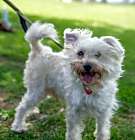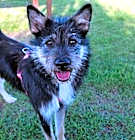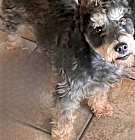Color
Black - with Tan, Yellow or Fawn
Size
(when grown) Small 25 lbs (11 kg) or less
Details
Good with kids
Good with dogs
Not good with cats
Spayed or Neutered
Shots are up-to-date
Story
PLEASE READ THIS PROFILE AND THE REQUESTED CRITERIA BEFORE CALLING OR SUBMITTING AN APPLICATION. THANKS FOR YOUR ATTENTION AND CONSIDERATION
INTRODUCING MR. FINLEY….. This 4-5 year old, 18 lb dapper dude is a mix of a few breeds – possibly Shih Tzu, Lhasa Apso, Schnauzer, and Poodle (his mother was probably a hussy)! Whatever he is, it’s 100% adorable.
We don’t know about Finley’s past, but it’s clear he hasn’t had an easy time. Initially, he is a bit skittish and shy, he will hide and you may have to “nudge” him to you — but with patience and love, he transforms into a sweet and affectionate companion. He’s currently thriving at Doggie Daycare, where he’s learning to socialize and be more confident. They have told us that he has really settled in and is getting along famously with the other dogs!
Finley would do best in a calm and reassuring environment, hopefully with a yard and another playful, happy dog, maybe even a little bigger than he is. Training will help him bond and adjust, especially in the potty department. He is very smart and once his fear subsides, we’re sure he will be an easy train. He’s great with other dogs and kids over 8 yrs, and once he feels safe and loved, he’ll be a loyal and loving companion.
The key element to success with Finley will be patience and love. He is not a big barker and will be a wonderful companion once he is comfortable and realizes he is safe and loved. If you’re looking for a furry friend who just needs a little extra TLC, patience and love, Finley could be the perfect match for you! Are you ready to open your heart and home to this sweet boy?
Our website is updated daily. Please do not apply for this dog unless your home fits the specified criteria. All of our dogs are spayed/neutered, microchipped, groomed, vet checked, dewormed, deflea'd and come with a leash, collar and ID
If you are interested in adopting a pup from Lhasa Happy Homes, please complete the Adoption Application before calling. We will contact you once it has been reviewed.
Lhasa Happy Homes will be now holding our adoption events the 1st and 3rd Sundays of the month on Main Street in Santa Monica (check calendar link below for special events and directions). Our event is located at 2116 Main Street, in Santa Monica, CA. Here you will have an opportunity to interact with the dogs and see which might be a perfect fit with your household. Main Street is famous for its innovative shops and is close to the beach! Make a day of it!! Metered parking on the street and free parking on 4th and Bicknell Streets.
Here you will have an opportunity to interact with the dogs and see which might be a perfect fit with your household....and do some fantastic shopping at the same time! Please do call us if you are coming to see a particular dog to make sure he/she will be at adoptions (we do not bring sick dogs to our adoption events). Please bring pictures or video of your home and yard if we have not done a home check (preferred)! Most importantly, if you have a dog, make sure you bring him or her to do a compatibility match with the dog you are interested in adopting!
Don't forget to check out our Events Calendar for more information on upcoming events!
See our home page for more details about our adoptions at Lhasa Happy Homes
Thanks for thinking rescue and adoption and for considering saving a life. It will be the best gift you ever give yourself or your family.

















